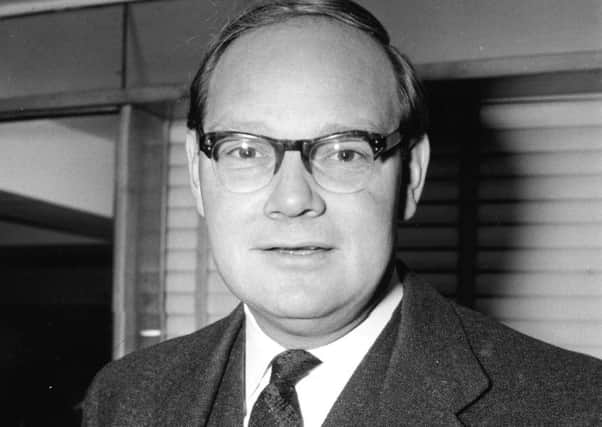Obituary: Cliff Michelmore, broadcaster


Cliff Michelmore was one of British television’s best known presenters who, in a career spanning almost 50 years, fronted the BBC’s ground-breaking current affairs programme, Tonight, while also presenting the long-running Holiday programme and anchoring the Apollo moon landings, general election results programmes and presiding over moments of high live drama, notably the assassination of President Kennedy and the return of the damaged Apollo 13, as well as conducting Prince Charles’ first TV interview. He was also a stalwart of BBC radio.
With a calm, unflappable style, genial manner and trademark spectacles, he helped usher in a more informal style of journalism onto TV screens, regularly sitting on the edge of his desk; he coined the catchphrase, “The next Tonight will be tomorrow night – goodnight.”
Advertisement
Hide AdAdvertisement
Hide AdHe did, however, have a tough streak and helped pioneer a new, uncompromising interview style, a precursor for the likes of Jeremy Paxman, which was a departure from the much more restrained and convivial interviews of the time.
With television very much in its infancy and full of “stuffed shirts” and plummy accents, Michelmore was described as the first TV celebrity who came across “one of us”. Sir Antony Jay, a trainee on the Tonight programme recalled, “There was no pretence, no feeling of “performance” about him. He was just Cliff, take him or leave him. And of course the audience took him, in their millions.”
Born in Cowes in 1919, Clifford Arthur Michelmore was the youngest of six children. His parents had moved to the Isle of Wight before the First World War, in order to help his father’s tuberculosis, but he died before Cliff was three; his sister also did of TB.
Brought up on a local farm by his older sister and her husband, he attended Cowes Senior School, where he became head boy and cricket captain, and rather alarmed the staff with his eagerness to organise everything and everybody.
At 16, he left school to join the RAF, undergoing basic training at RAF Halton, Buckinghamshire. Following the outbreak of war in 1939, he was sent as part of the Advanced Air Striking Force to defend France, “a stirring title,” he later reflected, “for a far from stirring force.”
During this period, Michelmore started broadcasting on British Forces Network (BFN) radio, becoming deputy director, doing commentaries on inter-service games and performing plays.
He remembered a production of The Adventures of Robin Hood, in which he played Little John, Nigel Davenport played Robin, Raymond Baxter Guy de Guisborne, Geraint Evans Blondel, Bryan Forbes Will Scarlet and Roger Moore a forester.
While posted to Hamburg, in 1947, he got his big break when he was asked step in and host BBC radio show Two-Way Family Favourites, which connected British service personnel with their families back in the UK. He met his wife Jean Metcalfe on the show; she was the London anchor and he reportedly said that it was “love at first hearing”. It was perfect timing; his ill-fated wartime marriage to a nurse ended in 1949. The romance blossomed after meeting in spring 1949 in London.
Advertisement
Hide AdAdvertisement
Hide AdFrom there, he began working for BBC radio and television as a freelance sports commentator, later becoming a news reporter and subsequently as a producer of children’s programmes. In 1955 Michelmore moved into evening television with the BBC’s topical current affairs programme, Highlight.
Two years later the BBC launched Tonight, a new early evening current affairs programme with Michelmore at the helm. It blended serious issues with more quirky human features, and also launched the careers of the likes of Alan Whicker, Fyfe Robertson and Magnus Magnusson.
Broadcast five nights a week, Tonight won a number of awards between 1957 and 1965 and Michelmore was named 1958 BAFTA Television Personality of the Year. He was on air when news of President John F Kennedy (November 1963) came through. With confusion in the gallery as to what had actually happened he had to fill-in. “It was certainly a moment that I will remember for ever.” A year later he introduced a 17-year-old David Bowie to his first television audience.
In 1965 he presented Tonight’s successor, 24 Hours. He went on to introduce the General Election results in 1964, 1966 and 1970 as well as masterminding the BBC’s television coverage of the Apollo Moon landings and subsequent missions.
During the 70s he continued to work on both mediums, and completed a series of interviews under the title With Michelmore; subjects included Ginger Rogers and Field Marshal Montgomery, who confessed that his favourite television programme was Come Dancing, “the one with all those pwetty girls in pwetty fwocks dancing in formation”. He also appeared on the 1971 Morecambe and Wise Christmas Show, taking part with other presenters in the famous top hat and tails dance routine.
Michelmore was a regular presenter on the Holiday programme (1969-1986) in which he and others travelled the globe to exotic destinations, compiling reports on the good, the bad and the ugly. There was, however, some criticism that many of the featured destinations were out of the price range of the majority of the programme’s viewers.
In retirement, he continued to broadcast for BBC, ITV and BBC Radio and stepped down in 2003. Aged 87, in November 2007, he made a surprise return to the BBC Parliament Channel to introduce a programme marking the 40th anniversary of the 1967 sterling devaluation crisis.
He married Jean Metcalfe in 1950. She died in 2000. He is survived by his children, Guy and Jenny.
Martin Childs